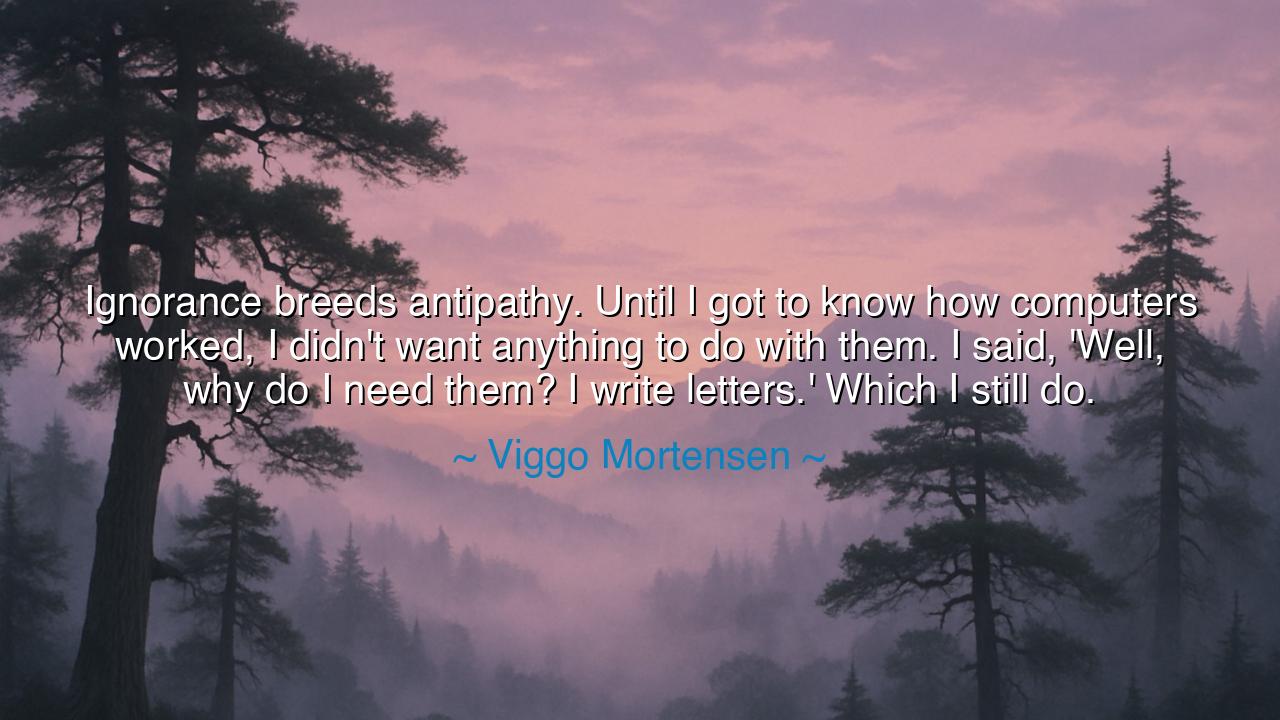
Ignorance breeds antipathy. Until I got to know how computers
Ignorance breeds antipathy. Until I got to know how computers worked, I didn't want anything to do with them. I said, 'Well, why do I need them? I write letters.' Which I still do.






When Viggo Mortensen said, “Ignorance breeds antipathy. Until I got to know how computers worked, I didn't want anything to do with them. I said, 'Well, why do I need them? I write letters.' Which I still do,” he gave voice to an ancient truth: that ignorance often fuels fear and hatred of the unknown. Mortensen’s words reveal how we, as humans, often resist what we do not understand. His journey from resistance to understanding of computers reflects a deeper theme, one as old as humanity itself: the fear of change and the unwillingness to embrace new ways of thinking. He was, in essence, speaking not just about technology, but about the human tendency to resist that which challenges the familiar.
The story of the human condition is filled with similar examples of resistance to new ideas. Socrates, the great philosopher, was condemned to death because he questioned the beliefs and traditions of his society, challenging his fellow citizens to think differently about life, knowledge, and virtue. He was, in a sense, rejected by his people because his ideas were not understood, and they feared the disruption his thoughts might cause. Similarly, Mortensen’s initial antipathy toward computers reflects the human instinct to protect the familiar, to hold on to the known, even if that means rejecting the potential for growth and progress.
In the realm of science and innovation, this same dynamic has played out across history. When Galileo Galilei first proposed that the Earth revolves around the Sun, he faced fierce opposition, not just from the religious authorities of his time, but from people who could not comprehend or accept the possibility of a universe in which their long-held beliefs were wrong. The antipathy that arose from ignorance was not simply a matter of misunderstanding, but of fear — fear that the old ways would be displaced, that the world they knew would fall apart. Yet, just as Galileo's work ultimately reshaped the world, so too does Mortensen's story remind us that embracing the unknown can lead to profound discovery and growth.
The meaning of Mortensen’s words, then, lies in the power of understanding to transform resistance into acceptance. Before he took the time to understand how computers worked, Mortensen’s instinct was to dismiss them. Like many others before him, he saw technology as an enemy of the familiar. But once he learned about it, his perspective shifted. This is the heart of wisdom: understanding breaks down the walls of ignorance. When we take the time to understand something — whether it’s a new technology, a new idea, or a new culture — the fear and antipathy we once felt toward it fades. We see it not as an adversary, but as a tool that can enhance our lives.
This transformation from ignorance to understanding is also reflected in the story of Thomas Edison. The famous inventor faced skepticism and criticism throughout his career, especially when he proposed the use of electricity to light homes, replacing the gas lamps of the time. At first, people resisted the idea, afraid of the unknown. Yet Edison did not shy away from the challenge. He believed in the power of understanding and the potential of his ideas. Over time, through his persistence and his ability to teach others about the technology, he overcame the initial antipathy and fear, revolutionizing the world in the process.
The lesson Mortensen teaches us is not simply about technology, but about life itself: when we fear something, it is often because we do not understand it. But as we take the time to explore, to learn, to engage with the unfamiliar, we can turn that fear into understanding. Ignorance is not an enemy to be battled, but a veil that can be lifted with curiosity and knowledge. Mortensen’s quote calls us to look beyond our initial discomforts and fears, and to embrace new ideas with an open heart, knowing that on the other side of our resistance lies the potential for growth.
In our own lives, we face moments when we, like Mortensen, feel the tug of resistance to change. Whether it’s a new technology, a new belief, or a new approach to life, we are often tempted to dismiss it simply because it challenges the familiar. But the true wisdom comes when we choose to look beyond the surface, to dive deep into understanding, and to approach the unknown not with fear, but with the courage to see its potential.
Practical actions for overcoming antipathy and embracing understanding:
-
Learn before judging: When confronted with something new, take the time to understand it before forming an opinion.
-
Embrace discomfort: Know that the unfamiliar can be uncomfortable, but it is through discomfort that growth occurs.
-
Ask questions: Curiosity is the antidote to fear. Ask questions and seek answers to dispel ignorance.
-
Teach others: Share what you’ve learned with those around you. As Edison and Socrates did, help others see beyond their initial resistance.
For as Viggo Mortensen so wisely reminds us, ignorance breeds antipathy, but understanding breeds connection. In a world filled with change, it is understanding — not resistance — that allows us to move forward with confidence and clarity.






AAdministratorAdministrator
Welcome, honored guests. Please leave a comment, we will respond soon